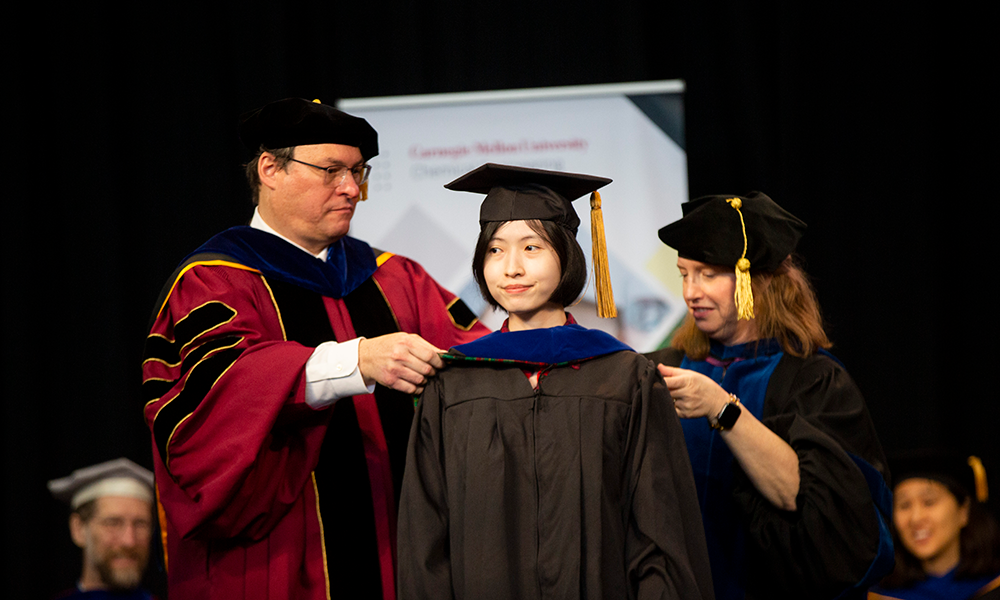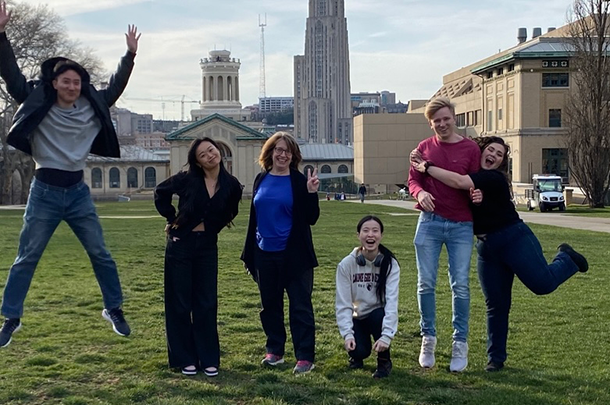Looking beyond the lab to scale bioprocess productivity
Lauren Smith
May 28, 2024

Flexibility and freedom characterized Leran (Lynn) Mao's research experience as a Ph.D. student in the Department of Chemical Engineering. "I knew the essential topics in my research group, and I could be the driver of my research directions, what I think would be interesting and useful to deliver in industry," says Mao ('23).
With her advisor, Anne Skaja Robinson, Mao contributed to several bioprocessing projects to produce valuable materials, like antibodies for vaccines, from cells. As engineers, they focus on delivering good quality products and scaling production. "Some of my projects covered ways to increase the productivity, or the amount of those drug products that we can deliver to the market for people in dire need," says Mao.
She was inspired by Robinson's earlier work on cellular stress. A little stress can increase cellular productivity. Too much stress can reduce productivity and negatively affect the quality of the drug products. Mao's research targeted a "sweet spot" in the middle to achieve optimal productivity in a bioprocess.
While it's common to think of a Ph.D. as only about depth in a specialty, Mao says that was not her experience. She looked beyond bioprocessing to apply other areas, including machine learning and data science, to her research.
Mao developed her own approach to modeling cell culture to better predict the effect of combined chemical additives on protein concentration and glycosylation, in which a carbohydrate is enzymatically attached to a protein and alters the protein's efficacy in the body.
At her graduation, Mao received the Ken Meyer Doctoral Research Award from the Department of Chemical Engineering. She was selected by the faculty based on research quality, productivity, recognition, and impact.

Source: Lynn Mao
Lynn Mao (third from right) with her research group at Carnegie Mellon University
Early on, as Mao was preparing for her qualifying exam after her first year in the Ph.D. program, she was advised to know how her research method works. "Although it was stressful preparing for the exam, I was glad that the importance of 'knowing how it works' was made clear to me. It changed my way of thinking," she says. "It also made a lot of discussions in my job interviews much smoother." Mao thinks that other students can apply the same advice to master how their code, instrument, or technique works.
In the Ph.D. program, Mao found a supportive environment to explore careers in both industry and academia. Research collaborations, a presentation requirement, and networking opportunities helped her prepare to transfer soft and technical skills. She chose to start her career in industry.
Mao is a senior scientist at AstraZeneca, in the cell culture and fermentation sciences department. The job builds on her Ph.D. work in bioprocessing. The biopharmaceutical industry uses cells to produce antibodies and derivative products, including vaccines that could treat cancer and a variety of other diseases. Mao's team works on pipeline projects in the commercialization of these products.
Part of Mao's motivation for working in the biotechnology industry is her family, many of whom are healthcare workers. Her father is a physician specializing in infectious diseases. "It was very stressful during the height of the COVID-19 pandemic," recalls Mao. "Working in the infectious disease department, he had to be in contact with patients. In the biopharmaceutical industry, we deliver drugs, antibodies, and other products that can directly impact not only patients but also healthcare workers and their families."
The problems that Mao is working to solve are hard, and she likes that. Her interest in chemical engineering started while listening to an undergraduate classmate describe the challenges he thought a chemical engineer would encounter. Mao says her work scaling up new biotechnologies is only one example of how chemical engineers can bring a lot of good to people.
